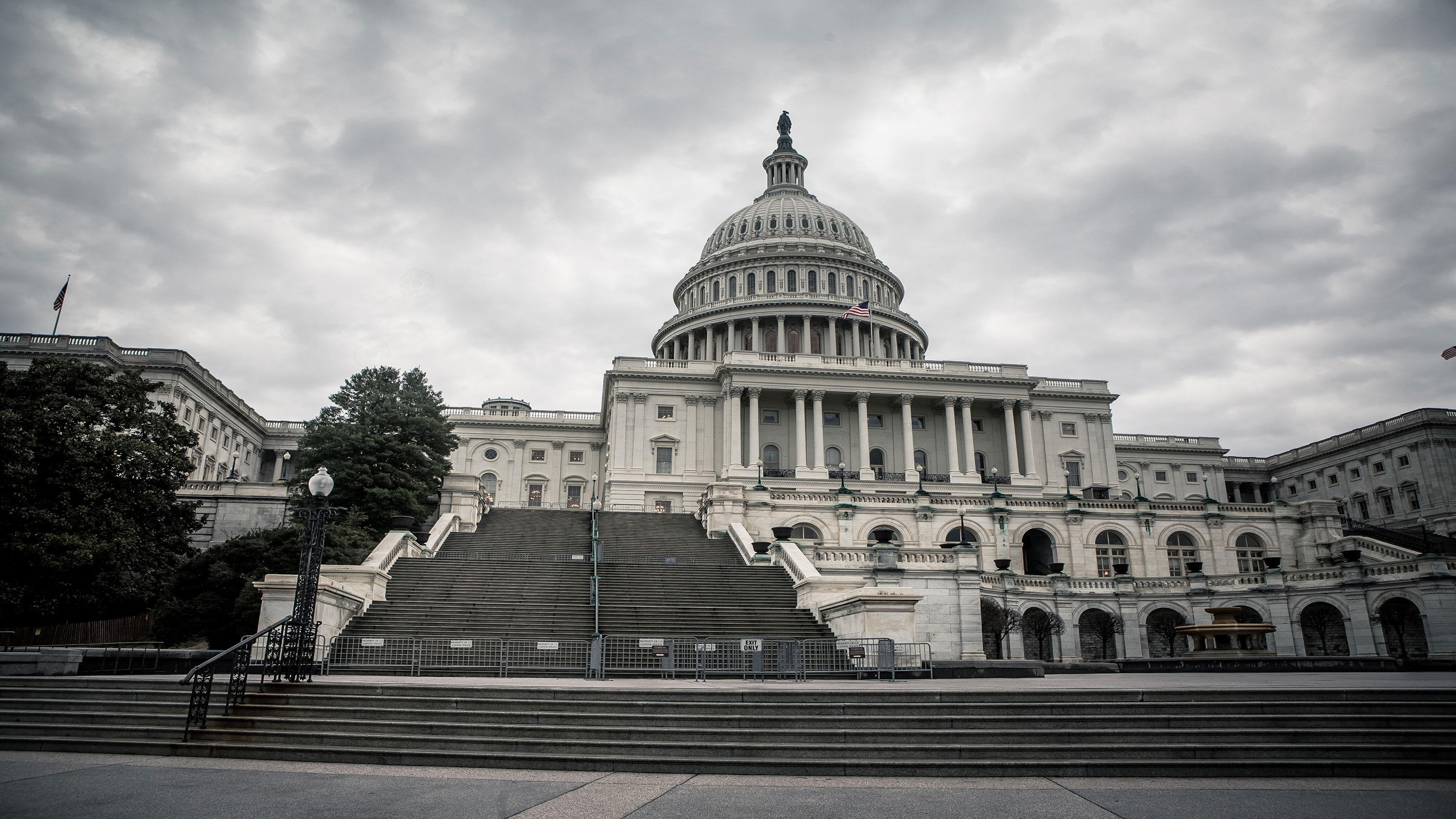After the Midterms, Expect Gridlock to Reign on Capitol Hill
A bitterly divided Congress will fight over everything. Plus, a GOP House will be eager to launch investigations.


Profit and prosper with the best of Kiplinger's advice on investing, taxes, retirement, personal finance and much more. Delivered daily. Enter your email in the box and click Sign Me Up.
You are now subscribed
Your newsletter sign-up was successful
Want to add more newsletters?

Delivered daily
Kiplinger Today
Profit and prosper with the best of Kiplinger's advice on investing, taxes, retirement, personal finance and much more delivered daily. Smart money moves start here.

Sent five days a week
Kiplinger A Step Ahead
Get practical help to make better financial decisions in your everyday life, from spending to savings on top deals.

Delivered daily
Kiplinger Closing Bell
Get today's biggest financial and investing headlines delivered to your inbox every day the U.S. stock market is open.

Sent twice a week
Kiplinger Adviser Intel
Financial pros across the country share best practices and fresh tactics to preserve and grow your wealth.

Delivered weekly
Kiplinger Tax Tips
Trim your federal and state tax bills with practical tax-planning and tax-cutting strategies.

Sent twice a week
Kiplinger Retirement Tips
Your twice-a-week guide to planning and enjoying a financially secure and richly rewarding retirement

Sent bimonthly.
Kiplinger Adviser Angle
Insights for advisers, wealth managers and other financial professionals.

Sent twice a week
Kiplinger Investing Weekly
Your twice-a-week roundup of promising stocks, funds, companies and industries you should consider, ones you should avoid, and why.

Sent weekly for six weeks
Kiplinger Invest for Retirement
Your step-by-step six-part series on how to invest for retirement, from devising a successful strategy to exactly which investments to choose.
Divided government almost certainly is coming to Washington in January. While several congressional races are too close to call, Republicans are poised to hold a slim majority in the House while control of the Senate is still up in the air.
But the Republican “red wave” that party officials and others predicted failed to materialize, as Democrats, overall, exceeded expectations. The election was also another blow to the struggling polling industry, with most political handicappers predicting a far better outcome for the GOP, particularly in the House.
The fate of the Senate may not be known for several weeks, as the Georgia race between Democratic Sen. Raphael Warnock and Republican Herschel Walker – which may be the final decider – looks headed to a December runoff.
From just $107.88 $24.99 for Kiplinger Personal Finance
Become a smarter, better informed investor. Subscribe from just $107.88 $24.99, plus get up to 4 Special Issues

Sign up for Kiplinger’s Free Newsletters
Profit and prosper with the best of expert advice on investing, taxes, retirement, personal finance and more - straight to your e-mail.
Profit and prosper with the best of expert advice - straight to your e-mail.
Yet regardless of the final outcomes, the future of the next Congress is beginning to come into focus. Here’s what we know:
Legislative gridlock will be the rule
First, get ready for plenty of gridlock in Washington. With Republicans controlling at least one chamber of Congress beginning in January, they’ll attempt to thwart the Democrats’ agenda at every turn. Most GOP efforts to pass their own measures will fizzle in the Senate, since even if Democrats lose control of the upper chamber, they’d still wield the bill-killing filibuster. But a divided Congress also deprives Democrats of the ability to pass any grand-scale proposals like the ones they successfully marshaled during President Joe Biden’s first two years in office.
So don’t expect much, if any, major legislation to reach the president’s desk during the next two years. And even “must pass” endeavors like spending bills needed to keep federal agencies operational, as well as raising the debt limit, will be extremely tough lifts and fraught with intense partisan fighting.
Intraparty tensions also will be on full display, particularly in the House. The Republicans’ presumed slim hold of the chamber means that its far-right wing will have a greater voice than if the party’s majority was larger, as GOP leadership will need every Republican vote to pass most anything. And the Democrats’ far-left contingent will continue to cause headaches for their party leaders.
Investigations by the GOP are coming
Plenty of investigations of the Biden administration, and possibly his family, are in store, now that House Republicans are poised to control the chamber and head its committees. Republicans have been champing at the bit to hold hearings and probes of the administration almost since the day President Biden took office, and they’ll be relentless in this pursuit. Homeland Security Secretary Alejandro Mayorkas and Health and Human Services Secretary Xavier Becerra will be particular targets, plus possibly Biden’s chief medical advisor, Anthony Fauci. And a special House committee to investigate the military’s flawed withdrawal from Afghanistan last year is in the cards.
No definitive conclusions may come of these investigations, though they’ll serve a strategic purpose for the GOP: Embarrassing the administration ahead of the 2024 presidential election.
Also look for Republicans to ramp up attacks at corporate ESG (environmental, social and governance) policies, arguing that the liberal movement undermines shareholder profitability. Such efforts likely won’t survive the Senate, regardless of which party is in control there.
Manchin's still a key vote
But before the new Congress is sworn in on Jan. 3, lawmakers will have plenty of work to do. Most notably, a massive government funding bill must pass by Dec. 16. Failure to do so would result in a government shutdown, a scenario neither party wants just days before the year-end holidays. And lawmakers still haven’t completed work on the National Defense Authorization Act (NDAA), a critical annual bill that sets spending levels for the Pentagon.
Once again, Sen. Joe Manchin (D-WV) will be at the center of attention during the lame duck period. Senate Majority Leader Chuck Schumer (D-NY) has promised him a vote on his proposal to reform the permitting process for energy projects like pipelines in return for his support of the Democrats’ massive climate, health care and tax law that passed this summer. Schumer will try to attach the provision to either the government spending or NDAA bills, though his party’s progressive wing will push back mightily.
Will Pelosi stay in power?
As for the party leadership ranks, most of the current leaders on Capitol Hill will remain, though there could be some big changes. House Minority Leader Kevin McCarthy (R-CA) is in line to become the next speaker, despite some grumblings in his ranks that he failed to shepherd the party to greater Election Day glory. His successful efforts to raise cash for and campaign with House Republican candidates will quell any dissent. And House Minority Whip Steve Scalise (R-LA) will assume the role of House Majority Leader without challenge.
Whether current Speaker Nancy Pelosi (D-CA) remains as her party’s leader is among the biggest questions in Washington. Pelosi, her second-in-command Steny Hoyer (MD) and third-in-command Jim Clyburn (SC) are all over 80 years old and face mounting pressure from younger Democrats to make way for a new generation of leaders. In the Senate, Chuck Schumer (D-NY) and Mitch McConnell (R-KY) will remain the party leaders.
Also on the Democrats’ agenda: A slew of federal judicial appointments. These will take higher priority if the odds of Democrats losing the Senate increase.
Profit and prosper with the best of Kiplinger's advice on investing, taxes, retirement, personal finance and much more. Delivered daily. Enter your email in the box and click Sign Me Up.

Sean Lengell covers Congress and government policy for The Kiplinger Letter. Before joining Kiplinger in January 2017 he served as a congressional reporter for eight years with the Washington Examiner and the Washington Times. He previously covered local news for the Tampa (Fla.) Tribune. A native of northern Illinois who spent much of his youth in St. Petersburg, Fla., he holds a bachelor's degree in English from Marquette University.
-
 Nasdaq Leads a Rocky Risk-On Rally: Stock Market Today
Nasdaq Leads a Rocky Risk-On Rally: Stock Market TodayAnother worrying bout of late-session weakness couldn't take down the main equity indexes on Wednesday.
-
 Quiz: Do You Know How to Avoid the "Medigap Trap?"
Quiz: Do You Know How to Avoid the "Medigap Trap?"Quiz Test your basic knowledge of the "Medigap Trap" in our quick quiz.
-
 5 Top Tax-Efficient Mutual Funds for Smarter Investing
5 Top Tax-Efficient Mutual Funds for Smarter InvestingMutual funds are many things, but "tax-friendly" usually isn't one of them. These are the exceptions.
-
 Trump Reshapes Foreign Policy
Trump Reshapes Foreign PolicyThe Kiplinger Letter The President starts the new year by putting allies and adversaries on notice.
-
 Congress Set for Busy Winter
Congress Set for Busy WinterThe Kiplinger Letter The Letter editors review the bills Congress will decide on this year. The government funding bill is paramount, but other issues vie for lawmakers’ attention.
-
 The Kiplinger Letter's 10 Forecasts for 2026
The Kiplinger Letter's 10 Forecasts for 2026The Kiplinger Letter Here are some of the biggest events and trends in economics, politics and tech that will shape the new year.
-
 Special Report: The Future of American Politics
Special Report: The Future of American PoliticsThe Kiplinger Letter Kiplinger assesses the political trends and challenges that will define the next decade.
-
 Are New Trump $2,000 Stimulus Payments Coming in 2026? What to Know Now
Are New Trump $2,000 Stimulus Payments Coming in 2026? What to Know NowTax Policy A promise of $2,000 tariff dividend checks is raising questions and fueling confusion.
-
 What Services Are Open During the Government Shutdown?
What Services Are Open During the Government Shutdown?The Kiplinger Letter As the shutdown drags on, many basic federal services will increasingly be affected.
-
 Banks Are Sounding the Alarm About Stablecoins
Banks Are Sounding the Alarm About StablecoinsThe Kiplinger Letter The banking industry says stablecoins could have a negative impact on lending.
-
 Trump's Economic Intervention
Trump's Economic InterventionThe Kiplinger Letter What to Make of Washington's Increasingly Hands-On Approach to Big Business